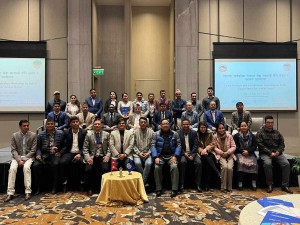
Residential Employable Skills Development Training- The Foreign Employment Board (FEB)

Residential Employable Skills Development Training on Garment Machine Operator Project, conducted by Action for Development (AfD) and funded by The Foreign Employment Board (FEB), aimed to empower Nepali women, particularly returnee migrants and aspiring migrants, with the necessary skills for employment in the garment industry. We have outlined the key outcomes, methodologies, and evaluation of the training program, which spanned for one month and covered three batches, each comprising of 20 participants.
Training Overview:
The training was structured, adhering to guidelines provided by the Foreign Employment Board (FEB). Each batch underwent a 30-day training program (167 hours) focused on both theoretical and practical aspects of garment machine operation. Training was delivered at AfD's facilities, which was equipped with modern tools and resources to facilitate effective learning. Participants were provided with a safe and supportive environment, including hygienic hostel accommodations and transportation facilities.
Monitoring and Evaluation:
A robust monitoring framework was implemented to ensure the quality and effectiveness of the training. The Training Coordinator and Monitoring Officer regularly assessed all phases of the training—pre-training, during training, and post-training. This included the use of standardized checklists, attendance logs, training logbooks, and performance tests. Regular feedback was gathered to make necessary adjustments and improvements.
Skills Testing and Certification:
Post-training, participants underwent a skill test facilitated by AfD. The trainees received a Training Completion Certificate in line with SaMi guidelines.
Job Placement:
AfD collaborated with SCC Manpower Company to link graduates with employment opportunities, particularly in Jordan. Graduates attended interviews, and preparations for migration were initiated for those selected during the training period.
Progress Reports:
AfD submitted progress reports after each training batch, along with an Inception Report, Quarterly Work Plan, and the final Training Completion Report.
GESI Integration:
The training program integrated Gender Equality and Social Inclusion (GESI) principles, ensuring a supportive environment for female trainees. AfD maintained a zero-tolerance policy on sexual harassment and gender-based violence, promoting a safe and respectful learning atmosphere.
1719914338.png)
Outcomes and Impact:
The training program successfully enhanced the skills of 60 women, preparing them for employment in the garment industry. The structured approach, combined with rigorous monitoring and supportive measures, ensured that participants were well-equipped to pursue job opportunities both locally and internationally. The post-training follow-up mechanisms established by AfD further supported the trainees in their employment journey.
Conclusion:
The Garment Machine Operator training program achieved its objectives of skill development and employment facilitation for Nepali women. The comprehensive training, coupled with monitoring, linkage, and supportive services, significantly contributed to the empowerment and economic independence of the participants. AfD remains committed to maintaining these standards and continuously improving the training framework to better serve the community.



1716882354.jpg)
